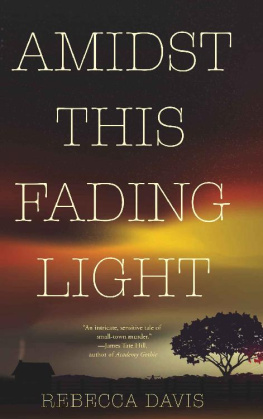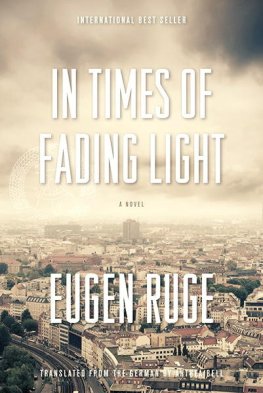Praise for Rebecca Davis
The tragedy at the center of this novel is deftly handled: How are we to survive the worst that life puts in our paths? Rebecca Davis knows the place she writes about, from the groundwater to the angle of the overhead sun, and, lucky for us readers, she knows its peopleand people everywherejust as well. This is such a generous and carefully told book that it's difficult to believe its the author's first.
Michael Parker, author of The Watery Part of the World & Everything, Then and Since
Rebecca Davis writes with a journalists detail, a historians wisdom, and a photographers understanding of shadows. Above all, she is a natural storyteller, evident on every page of her graceful debut. An intricate, sensitive tale of small-town murder, Amidst This Fading Light answers the question few mysteries ever ask: Who do we become in the wake of tragedy?
James Tate Hill, author of Academy Gothic
This remarkable novel in stories is built around a devastating act of violence, but Davis's empathy for her richly realized characters, her delicately realized prose, and her insights into human nature are the real draws. Amidst This Fading Light is an exciting debut, and Davis is a young writer to watch.
Holly Goddard Jones, author of The Salt Line
Books are available in quantity for promotional or premium use. For information, email .
All Rights Reserved. No part of this book may be reproduced or transmitted in any form or by any means, electronic or mechanical, including photocopying, recording, or by any information retrieval or storage system, without the prior written consent of the publisher.
This is a work of fiction. Names, characters, places and incidents either are the product of the authors imagination or are used fictitiously. Any resemblance to actual persons, living or dead, events, or locales is entirely coincidental.
Cover design by Olivia M. Croom.
Cover art by iStock.com/Vectorig.
Printed in the United States of America.
It was the breathless summer of 1919, and it was so hot that even the air seemed to sweat. All farm work had to be done before the sun reached midday. Production was lower than usual, which left more time to idle on porches or in front of the general store. While the men were out, the ladies busied themselves in the kitchen, prepping all the meals for the day (cold meats and potato salad) and then retired with their husbands out front with lace or paper fans in their hands. Each starched dress and cotton shirt was damp at the pits. There was nothing much left to do but listen and talk.
There was one porch packed more tightly than the rest, and it belonged to Mrs. Honora Brow. The Brows were the most well-to-do family in Germantown. The original Mr. Brow had maintained the only cemetery that serviced the community. Hed gotten his undertakers license in Reynolds. He was a man who smoked thick cigars and smelled like death, and in his later years, hed had a habit of pointing at people and telling them when they would die.
Prediction was a Brow tradition, and folks were always eager to hear a tale. If you asked anyone if they believed her fully, youd get a spread of vague answers and none of them firm. But the fact that people gathered and listened was a testament to the power the Brows held over the place. Honora claimed her fathers predictions always came true. The story she most often told was when her father pointed to her own husband, a young man of twenty-one, and said that he would die by the weeks end. Of course, at the time, Honora and her husband didnt buy it. Though, I had a feeling, you know, deep in my bones, Honora would later say. Her husband was out mending a fence one evening when he was shot straight through the head. One of their farmhands found him a few hours after and brought him up to the house, brains and blood leaking all the way. Honora said that she didnt let her husbands body into the house because it would spoil the cream rug hed bought her. He loved that rug. It was a wedding present for me. Hed saved up so much, I just couldnt let him ruin it. Her father, as the undertaker, gained possession of his son-in-laws body and, as Honora said, Fixed him up real nice. So nice that they held an open-casket funeral for him.
No one ever knew who shot Honoras husband, but it was probably a teenage boy hunting across the creek whod fired a wayward shot into the woods that caught the man in his temple. Hunting accidents happened all the time, really. In such a small place, it was not an off occurrence. After a while, everyone stopped talking about it, so Honora Brow told the tale from her porch. She decided to keep her maiden name and passed it on to her son so that Brow Cemetery would always be owned by a Brow. Her son, who had been born only a few months before his father died, went to school to become an undertaker and took over the cemetery, as his mother wanted. He married a local girl his mother approved of. The Brows had their fingers in all of Germantown. They told the news, knew the gossip, and handled the dead. Everyone knew that one day a Brow would be prepping them for coffins and lowering them into the ground. Everybody wanted to be on the best side of people like that, almost like they had some say in how folks left this world, some precursor to Judgment Day.
But, that summer, Mrs. Brow was only part of what caught and kept interest. That summer, a new family moved into Germantown. The Picketts. They seemed normal enough at the start. They were pulled by a fuzzy mare who seemed to die a little at each step. The man whipped her gently, but his arms were stiff and tense. His wife was beside him on the wagon, full of pregnancy. She swatted mosquitos from her face with a fan and kept her other hand pressed to her belly. The daughter and the son were in the back with a few belongings: a table, a wedding chest, a box that clinked with the sounds of china, two cots, and one bed frame. There were a few chickens huddled near the childrens feet. A cow walked behind the wagon, tied to the back.
Reggie Pickett had bought the old Himmel homeplace. It had weathered about ninety years, and Himmel had passed as little more than a skeleton. He died in that house. No one knew about it until a little boy noticed vultures pecking at the roof. Some of the men went out there and found Himmel in a corner, body stiff and smelling. There were rats there, too. Someone said that the rats had eaten out the eyeballs. Someone else said they figured that the smell would never leave the place. But, Reggie Pickett bought the house anyway, and moved his little family in.
The Picketts arrival wasnt unexpected because Reggies older brother, Marlowe, had come before him by about three years. But Marlowe, unlike Reggie, had never been a sharecropper; instead of inheriting their fathers farm, he bought his own out in Germantown, bringing along his wife and two children. The wife had died about a year after theyd moved. Mrs. Honora had predicted that one. She pointed to that little bird-faced woman and said she would die in childbirth. And Lace Pickett did, moaning and clawing at her husband, while the midwife stood by with her hands at her apron. The doctor was a county over. Everyone felt sorry for Marlowe, and he took the charity with grace. He accepted the food and drinks and long afternoons of chewing and spitting and smoking and talking about nothing but life and death, and at some point he had mentioned his brother, Reggie, and his family, and that Reggie was reckoning on whether or not to quit sharecropping and move to Germantown. Marlowe said that Reggie was a little odd. No one thought to ask how odd, because there were more interesting things to talk about: like Laces death and how all those cakes and pies were so good.

